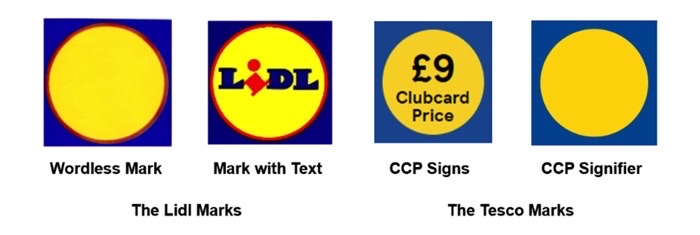This post is the second of four, considering the decision of Smith J in Lidl v Tesco [2023] EWHC 873 (Ch), focusing on the passing off element of the judgment. Many were surprised that Lidl was successful on this ground, as it was not a traditional case of selling goods as those of another.
Background
The novelty of Lidl’s argument in bringing a passing off claim was their contention that, through the use of the CCP Signs shown below, Tesco sought to misrepresent its goods by equivalence rather than origin. Lidl essentially claimed that Tesco had misrepresented that its products were of equivalent good standard and sold at the same or equivalent price as Lidl’s products or were otherwise “price-matched” to them.

Goodwill
Lidl argued that it had acquired valuable and substantial goodwill in the Lidl Marks, and specifically that the Mark with Text had come to signify the business, services and goods of Lidl “and no other”.
Tesco acknowledged that there was goodwill in the Mark with Text to the extent it indicated the origin of retail services that Lidl provides, but not that the retail services or goods were of a particular standard, quality or price. Tesco denied any goodwill in the Wordless Mark, as they claimed no genuine use had been made of it.
Smith J accepted Lidl’s arguments that consumers recognise the Lidl Marks as indicating Lidl’s goodwill, which included its reputation as a discounter, offering goods at low prices but stopped short of widening this to cover an unspecified “quality” or “standard” of goods. The witness evidence, coupled with the YouGov survey, bolstered this finding.
Misrepresentation
It was Lidl’s case that in using the CCP Signs, a substantial number of consumers would believe that the Clubcard Price offered by Tesco was the same or lower than that offered by Lidl for equivalent goods, and this would deceive price-sensitive consumers into “switching-away” from Lidl.
Smith J found that although the court could not accurately quantify the proportion of consumers deceived, the evidence suggested a substantial number had been misled. The Judge noted that marketing campaigns featuring the CCP Signs had occurred across various media, and a high percentage of the UK population shops at Tesco at least occasionally, so large numbers of consumers would have seen the CCP Signs.
Tesco’s submission that there was no evidence that Lidl’s prices were, in fact, generally lower than Tesco’s prices was rejected. Smith J held that what Lidl needed to establish was that the impression gained by consumers when viewing the CCP Signs (i.e. that Tesco’s Clubcard Prices are the same or lower than the prices offered by Lidl) is misconceived. The fact that some Tesco prices may be lower did not address or mitigate this. The problem was that consumers would think they did not need to check if they could get a particular product cheaper at Lidl because Tesco had already checked. As such, deception was clear, although Smith J stopped short of finding that Tesco had deliberately intended to mislead.
Damage
Smith J found that Lidl had suffered damage by reason of Tesco’s misrepresentation for the same reasons established for trade mark infringement, namely that Tesco had diluted Lidl’s brand and successfully slowed consumers “switching” or “trading out” to Lidl. This damage was evidenced by the fact that Lidl had found it necessary to take evasive action in the form of corrective advertising, running a large-scale “Unmatched Value” price comparison campaign, with an additional campaign specifically focussed on Clubcard Prices.
Conclusion
This decision is a helpful development in passing off as a cause of action. The key takeaway is that passing off claims are not confined to misrepresentations as to origin but can be extended to include misrepresentations as to equivalence. To successfully bring such a claim, it will be imperative for the rights holder to have strong evidence that the goodwill in their mark extends beyond the goods or services offered to the reputation developed in their offering as a whole – a comparative example at the other end of the scale may be Fortnum & Mason, which is well-known for providing high-quality products with a reputation for luxury.
_____________________________
To make sure you do not miss out on regular updates from the Kluwer Trademark Blog, please subscribe here.


